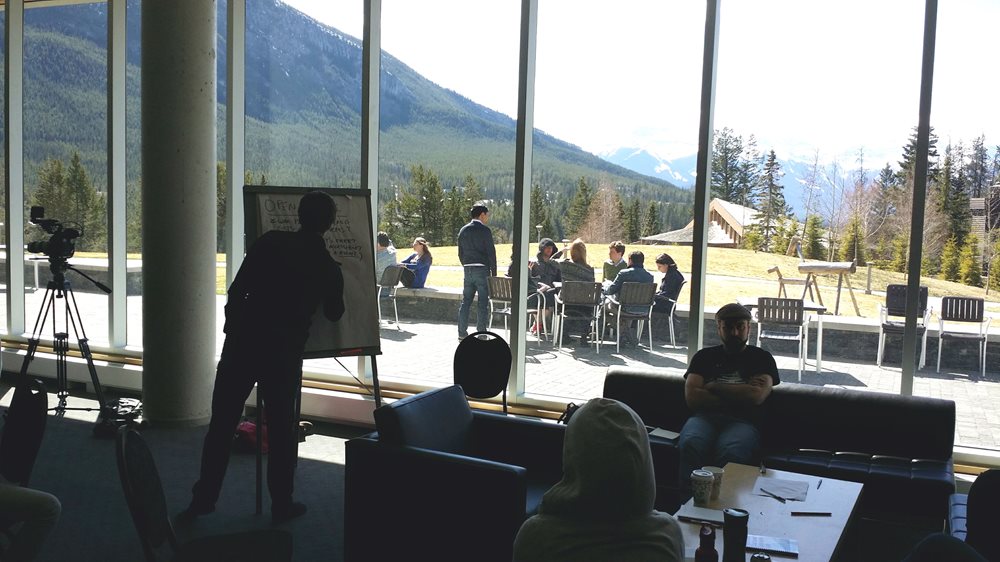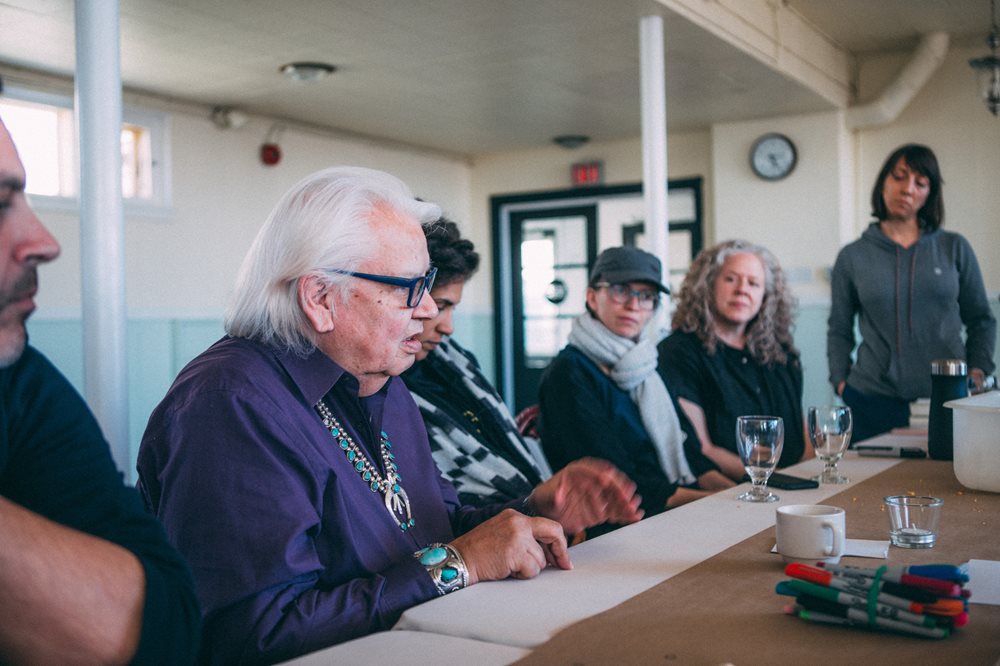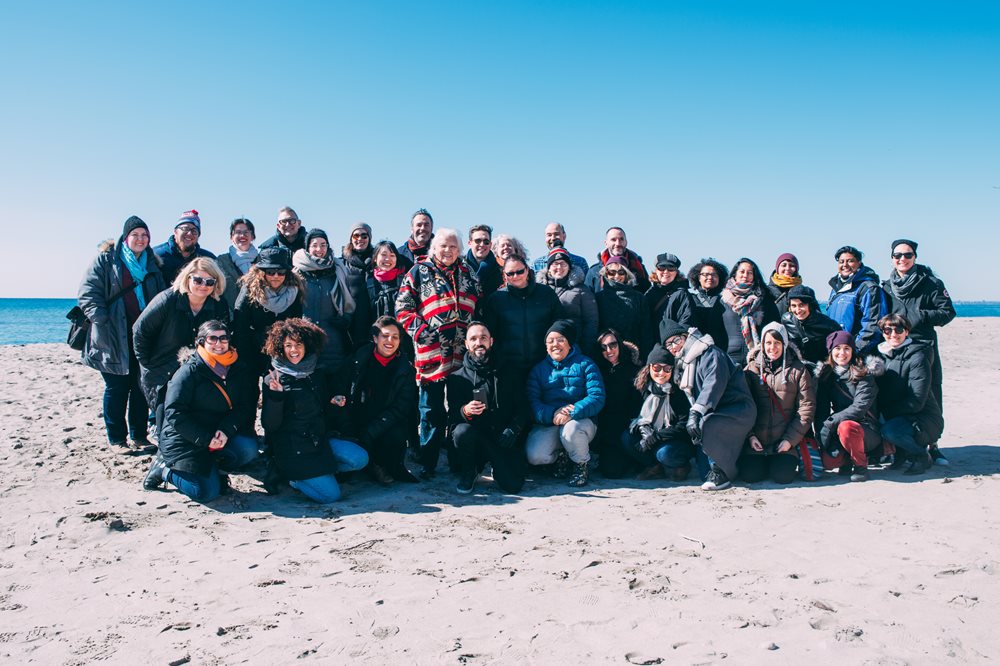Featured Story: TAC Leaders Lab
June 2018
“Arts leaders frequently put themselves last in line when it comes to professional development,” says Claire Hopkinson, Director & CEO of Toronto Arts Council. “Whereas individual dancers and singers recognize the need for continued professional development, it’s not well embraced at the organizational level. To be healthy, to be reflective, to grow in confidence, we all need the occasion to pause during our careers and examine our work,” she continues. It’s with this philosophy in mind that TAC in collaboration with Banff Centre for Arts and Creativity, created the TAC Leaders Lab program in 2014.
 The inaugural TAC Leaders Lab cohort at Banff Centre for Arts and Creativity
The inaugural TAC Leaders Lab cohort at Banff Centre for Arts and Creativity
Now in its fourth year, the program offers year-round leadership workshops and activities for arts professionals. It has become a crucial part of the development of Toronto’s arts sector, ensuring that new learnings, relationships and professional opportunities have opened for Leaders Lab participants.
Every year, eighteen individuals, working in a variety of arts disciplines, are selected by a jury to participate in the program. Leaders Lab Fellows reflect the population of Toronto and include artists, arts educators, producers, administrators, and those running major institutions. Their work together, led by an Indigenous teacher and selected facilitators, begins with a week-long leadership retreat at Banff Centre for Arts and Creativity, while subsequent sessions take place in Toronto. Topics covered range from challenges in leadership development to examining Toronto’s arts ecology.
The City of Toronto is growing, and so is its arts sector. In 1974 when TAC was first established, its total budget was $315,000. Today, TAC’s grants budget is $18 million, and the number of applications continues to increase. Just like the need to increase investment in the arts to support our growing sector, Toronto needs effective, collaborative and confident arts leaders to ensure that these funds are leveraged to their full impact. TAC Leaders Lab is helping to provide the next generation of professionals the tools they need to succeed in new leadership roles. Furthermore, by learning alongside arts leaders, TAC is positioned to anticipate, listen and adapt to the needs of the arts sector.
 Elder Duke Redbird leads a workshop session. Photo by Gilad Cohen
Elder Duke Redbird leads a workshop session. Photo by Gilad Cohen
Feedback from Lab participants tells us that the program is giving them space to identify and discuss common issues that arise in their work. Because the Fellows come from a variety of positions and practices, it offers a rare opportunity for multi-disciplinary collaboration and learning, of both successes and failures. This model is something that past fellows are taking back to their own organizations; many are adopting a relational model of leadership where success prioritizes empowering those around you.
The first three cohorts of the TAC Leaders Lab met this past April at the first alumni gathering, facilitated by Toronto Arts Council. The gathering was intended as a networking and brainstorming event, and gave the group an opportunity to discuss next steps for graduated cohorts. The resounding consensus was that the group should stay connected through regular meetings. Collaborating to take on sector-wide issues through advocacy campaigns, the need to establish systems that encourage self-care among arts workers, and the desire to build new leadership models were some of the things that the group discussed.
“Our hope is that the TAC Leaders Lab can help participants create collaborations, open doors and gain insights to be even more fully engaged in the larger community,” says Claire Hopkinson. “Decisions about quality of life in Toronto are being made around many tables across the city. It’s clear to me that cultural leaders have an important voice to add. I hope that one of the outcomes for TAC Leaders Lab Fellows is incentive and confidence to add to conversations taking place across many sectors.”
 2017 and 2018 TAC Leaders Lab Fellows at Artscape Gibraltar Point. Photo by Gilad Cohen
2017 and 2018 TAC Leaders Lab Fellows at Artscape Gibraltar Point. Photo by Gilad Cohen
John Caffrey, a multidisciplinary artist and participant of the 2016 cohort, commented on the uniqueness of the arts sector, stating that “culture is so much tied to identity... [the arts sector values] making space and prioritizing voices. It’s often unprofitable, but it’s meaningful.” The human aspect of the arts and all that it offers, including expression, understanding, new perspectives and so much more, is precisely why arts leaders should be involved in discussions that have city-wide and neighbourhood repercussions. With a network of arts leaders united in their goal to strengthen the city through the arts, Toronto’s arts and culture sector is positioned to be resilient for years to come.
TAC Leaders Lab is a partnership program with Banff Centre for Arts and Creativity
Public funding for the arts helps support the professional development of arts leaders through the TAC Leaders Lab program. Let your political representatives know that you support the arts.